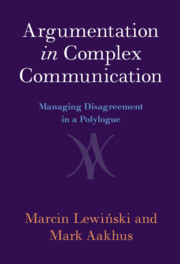Book contents
- Argumentation in Complex Communication
- Argumentation in Complex Communication
- Copyright page
- Contents
- Figures
- Preface
- Part I Seeking, Seeing, and Embracing Polylogue
- Part II Analyzing, Evaluating, and Designing Polylogue
- Chapter 5 Descriptive Analysis of Polylogues
- Chapter 6 Normative Evaluation of Polylogues
- Chapter 7 Prescriptive Design of Polylogues
- Chapter 8 Conclusion
- References
- Index
Chapter 6 - Normative Evaluation of Polylogues
from Part II - Analyzing, Evaluating, and Designing Polylogue
Published online by Cambridge University Press: 22 February 2023
- Argumentation in Complex Communication
- Argumentation in Complex Communication
- Copyright page
- Contents
- Figures
- Preface
- Part I Seeking, Seeing, and Embracing Polylogue
- Part II Analyzing, Evaluating, and Designing Polylogue
- Chapter 5 Descriptive Analysis of Polylogues
- Chapter 6 Normative Evaluation of Polylogues
- Chapter 7 Prescriptive Design of Polylogues
- Chapter 8 Conclusion
- References
- Index
Summary
This chapter adopts one simple yet crucial principle of rationality – the contextually adequate contrast of reasons – as an important path for the normative evaluation of polylogue. This principle is consistent with the basic polylogical idea that arguing for a position is always arguing against other incompatible positions. The key normative obligation of any arguer is thus that of defending the contrastive bestness of the position advanced. The basic principle of contrastive reason can be contextually determined relative to the constraints and affordances of place for argumentation. As such, the principle is translatable into a normative condition from which to evaluate argumentation in complex communication: make a relevant expansion of a disagreement space. It is then demonstrated how this approach explains the false dilemma as a polylogical fallacy that neither logical nor dialectical approaches can adequately handle. The usefulness of this approach for evaluating the role of place in the management of disagreement in polylogue is also illustrated. Finally, the chapter discusses the intriguing and often paradoxical relations between individual and collective rationality that polylogue framework foregrounds, in contrast to most extant normative approaches in argumentation theory.
Keywords
- Type
- Chapter
- Information
- Argumentation in Complex CommunicationManaging Disagreement in a Polylogue, pp. 161 - 197Publisher: Cambridge University PressPrint publication year: 2022



